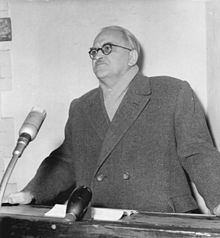Erwin Kramer
Erwin Kramer (born August 22, 1902 in Schneidemühl / West Prussia , † November 10, 1979 in Berlin ) was Minister for Transport of the GDR and General Director of the Deutsche Reichsbahn .
Life
After attending secondary school and doing an internship at the Reichsbahn repair shop in Schneidemühl from 1923 to 1929, Kramer studied electrical engineering and railway science at the Technical University of Berlin . From 1919 he was a member of the Communist Youth Association of Germany , from 1924 to 1927 of the Red Student Aid and from 1929 of the KPD . From 1930 to 1932 he was a site manager at the Reichsbahndirektion Berlin . From 1929/30 he belonged to the Revolutionary Trade Union Opposition , in which he took on a number of functions.
In 1932 Kramer was imprisoned in Berlin-Moabit . Because of the impending high treason trial , he emigrated to the USSR at the end of 1932 . He worked at the Central Research Institute for Transport in Moscow on the areas of rationalization and automation. At the same time he attended courses at the Communist University of the National Minorities of the West . In 1937 he attended a course in tactics at the military school "First Cavalry Army" in Tambov and then took on as an engineer officer of the XI. International Brigade participated in the Spanish Civil War.
From February to April 1939 he was interned in the French camp of Saint-Cyprien , after which he returned to the USSR. Kramer worked there as an engineer in a company and from 1941 as a spokesman and translator for the German editorial staff of Moscow Radio . In this context he also reported on crimes committed by the German armed forces during World War II. In October 1941 he was dismissed from the station after internal conflicts. He was also warned by the KPD leadership and evacuated to Kuibyshev . After the sale of food cards on the black market , he was expelled from the KPD in 1943. In 1945 he was a student at a political school near Moscow.
After his return to Germany at the end of 1945, Kramer joined the SED in 1946 . From 1946 to 1949 he was head of the mechanical engineering department of the German Economic Commission and from 1946 vice-president of the Reichsbahndirektion Berlin , from 1949 deputy general director and 1950 to 1970 general director of the Deutsche Reichsbahn . He was also Deputy Minister from 1953 and Minister for Transport from 1954 to 1970. From 1954 to 1970 he was a member of the Central Committee of the SED and from 1958 to 1979 a member of the People's Chamber (including in the Committee on Foreign Affairs).
His urn was in the grave conditioning Pergolenweg the memorial of the socialists at the Berlin Central Cemetery Friedrichsfelde buried.
Honors
In 1959 Kramer was awarded the National Prize , in 1967 with the Honor Clasp for the Patriotic Order of Merit , in 1970 with the Karl Marx Order and the Order of the Great Patriotic War and in 1977 the Star of Friendship of Nations .
The state railway Potsdam received the honorary name "Erwin Kramer" on August 20, 1982nd The engineering school for traffic engineering and the Neustrelitz railway depot also recently had this nickname. In 1986 a street in Berlin-Hellersdorf was named after him (since 1992 Carola-Neher-Straße).
literature
- Erwin Kramer , in: Internationales Biographisches Archiv 05/1980 from January 21, 1980, in the Munzinger archive ( beginning of article freely available)
- Peter Erler , Helmut Müller-Enbergs : Kramer, Erwin . In: Who was who in the GDR? 5th edition. Volume 1. Ch. Links, Berlin 2010, ISBN 978-3-86153-561-4 .
- Siegfried Mielke , Stefan Heinz : Railway trade unionists in the Nazi state. Persecution - Resistance - Emigration (1933–1945) . Metropol-Verlag, Berlin 2017, ISBN 978-3-86331-353-1 , pp. 307 f., 551 f. (Short biography).
Web links
Individual evidence
- ↑ Honorary name at the Deutsche Reichsbahn . In: Berliner Verkehrsblätter . No. 9 , 2019, pp. 178 .
- ^ Klaus-Jürgen Kühne: Railway depots in the GDR . transpress Verlag, page 2017, ISBN 978-3-613-71549-3 , page 91.
| personal data | |
|---|---|
| SURNAME | Kramer, Erwin |
| BRIEF DESCRIPTION | German politician (SED), MdV, Minister for Transport of the GDR and Director General of the Deutsche Reichsbahn |
| DATE OF BIRTH | August 22, 1902 |
| PLACE OF BIRTH | Schneidemühl , West Prussia |
| DATE OF DEATH | November 10, 1979 |
| Place of death | Berlin |

